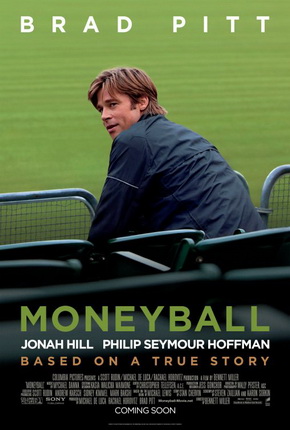“Moneyball” is major motion picture starring Brad Pitt that is based on Michael Lewis’ book of the same name. The movie, much like the book, is NOT about the use of anabolic steroids and performance-enhancing drugs in Major League Baseball. This has upset some sportswriters, notably Lance Williams. Williams is the co-author (along with Mark Fainaru-Wada) of “The Game of Shadows”; the Williams and Fainaur-Wada book used leaked grand jury testimony from the federal investigation of the Bay Area Laboratory Co-Operative (BALCO) to craft a narrative about the widespread use of steroids by professional baseball players.
Certainly, the Oakland Athletics of 2002 included several baseball players known to use anabolic steroids. However, who really wants to see a movie about steroids in baseball? Baseball fans have been able to read about the sport’s steroid problems in the newspaper on practically a daily basis for the past several years. The opportunity to see a good movie about baseball sans steroids allows baseball fans to escape the never-ending discussions about doping and asterisks that bombard them in the real world.
“Moneyball” is an account of general manager Billy Beane’s use of sabermetrics to assemble a highly competitive team that made the playoffs for four consecutive years. This happened despite the fact that the Athletics were a low-revenue franchise that competed at a great disadvantage to larger-market teams with deep pockets. Beane focused on computer analysis of important baseball statistics to acquire players with the “mental gifts” to play baseball.
Beane focused the limited budget on acquiring relatively inexpensive players who were good hitters according to the computers even though they appeared to lack the physical gifts of a power hitter.
“Power is something that can be acquired,” Beane is quoted as saying in Lewis’ Moneyball. “Good hitters develop power. Power hitters don’t become good hitters.”
Of course, the cynical, steroid-obsessed sportswriters will inevitably ask how a good hitter becomes a power hitter? How is power acquired? What role do steroids play in the acquisition of power?
Lance Williams clearly wants to remind us that at least nine players on the A’s roster between 2000 and 2004 were linked to steroid and/or human growth hormone (hGH) by the Mitchell Report. The implication is clear – steroids made good hitters into power hitters.
First baseman Jason Giambi admitted using several bodybuilding drugs such as Deca Durabolin, injectable testosterone, “The Cream” (topical testosterone), “The Clear” (THG) and hGH.
He also introduced his brother outfielder Jeremy Giambi to steroid dealer Greg Anderson. Jeremy enjoyed many of the same drugs as his brother.
Infielder Randy Velarde also bought steroids and hGH from Anderson.
Infielder FP Santangelo bought Deca Durabolin (nandrolone decanoate), testosterone and hGH from steroid dealer Kirk Radomski.
Santangelo introduced teammate outfielder Adam Piatt to Radomski.
Piatt admitted buying Deca Durabolin, testosterone and hGH for himself. He claimed to have shared the testosterone and hGH with teammate shortstop Miguel Tejada.
Designated hitter David Justice and catcher Cody McKay were also customers of Radomski. Justice bought 2-3 kits of hGH from Radomski.
Outfielder Jose Guillen bought $19,000 worth of steroids and other drugs from an anti-aging clinic called Palm Beach Rejuvenation Center.
If you are really looking for a movie about Barry Bonds and steroids in baseball, “Moneyball” does not fit the bill. You must wait for the film adaptation of “Game of Shadows.” HBO acquired the film rights for “Game of Shadows” in 2007. The status of this movie is unknown.

Source:
Williams, L. (October 25, 2011). Hollywood’s ‘Moneyball’ downplays steroid use. Retrieved from http://californiawatch.org/dailyreport/hollywoods-moneyball-downplays-steroid-use-13230

